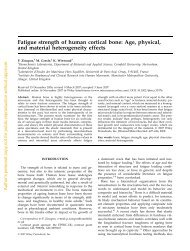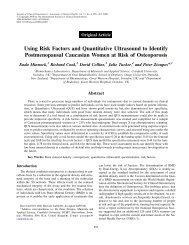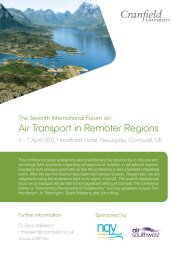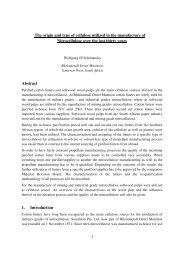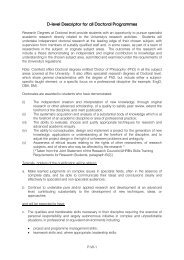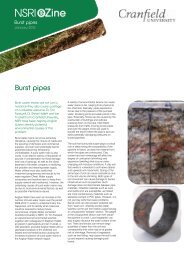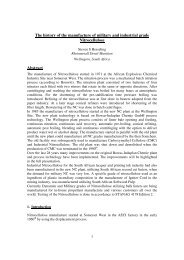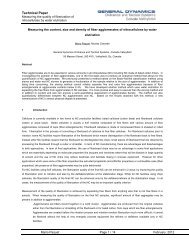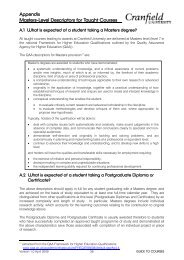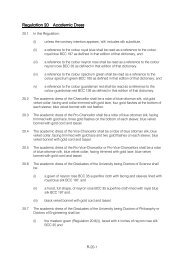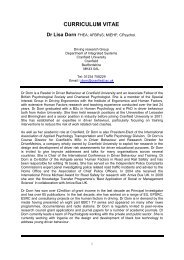Autumn 2002 PW 5 - Cranfield University
Autumn 2002 PW 5 - Cranfield University
Autumn 2002 PW 5 - Cranfield University
Create successful ePaper yourself
Turn your PDF publications into a flip-book with our unique Google optimized e-Paper software.
www. cranfield.ac.uk/alumni<br />
for CRANFIELD<br />
degree of Doctor of Science Honoris Causa<br />
Are you a parent? More specifically,<br />
are you a dad? If so, you’ve an<br />
important duty as role model that could<br />
make a major contribution to the future<br />
of the planet. Trouble is, you may not<br />
have recognised it yet.<br />
These days, most business concerns<br />
ensure they have an environmental policy<br />
– at worst it merely sits alongside the<br />
mission statement as a laudable aim, at<br />
best it has its own ‘SMART’ objectives<br />
and makes a difference.<br />
Take BP for example. Lord Browne –<br />
awarded a <strong>Cranfield</strong> honorary doctorate<br />
in June – is at the helm there and mindful<br />
of the implications of his global concern<br />
as a polluter.<br />
Amazingly, BP’s targets to reduce<br />
emissions were reached years ahead of<br />
time and now the company is at the forefront<br />
of looking for other ways to ameliorate<br />
the impact it has on the natural<br />
world, while still addressing the needs<br />
of its customers.<br />
“We will still be using oil and gas in<br />
very significant measure for well into<br />
the future, and it will be a long time<br />
before they are substituted. So new technologies<br />
enabling the reduction of<br />
“<br />
Any business, even<br />
individuals, can consider<br />
the implications of poor insulation,<br />
leaving doors open, badly<br />
maintained stock.<br />
”<br />
Lord Browne of Madingley,<br />
Group Chief Executive,<br />
BP plc<br />
hydro-carbons and CO2 are very<br />
important,” said Lord Browne, who in<br />
the spring announced a reduction in<br />
BP’s greenhouse emissions by more<br />
than nine million tonnes, eight years<br />
ahead of its target and at no net cost to<br />
the company.<br />
BP was voted one of the world’s most<br />
admired companies (FORTUNE March<br />
<strong>2002</strong>) and is the biggest supplier of oil<br />
and gas to the US.<br />
“We operate to make a profit that we<br />
can re-invest back into the country of<br />
source,” said Lord Browne, who has<br />
ideas on how everyone can help with<br />
energy conservation and the global concern<br />
about a sustainable environment.<br />
“Any business, even individuals, can<br />
consider the implications of poor insulation,<br />
leaving doors open, badly maintained<br />
stock. And today’s engines, with<br />
the right fuel and lubricants, could<br />
reduce CO2 by 400 mega-tonnes a year<br />
and now we can simulate without the<br />
need for flow models to assess the<br />
impacts of new design,” he added.<br />
But back to your family – research<br />
shows that boys have less respect for<br />
their immediate environment than girls.<br />
They are more likely to throw litter on<br />
the streets, forget to switch off lights,<br />
overlook recycling etc. It appears<br />
thoughtfulness isn’t sufficiently macho.<br />
Dads, it seems, need to show leadership<br />
both at home and at work.<br />
Having said that, perhaps your children<br />
have taught you a thing or two<br />
about caring for the environment…<br />
If that’s the case, share it with us:<br />
alumni@cranfield.ac.uk by Shirley Jones<br />
11<br />
CRANFIELD PEOPLE<br />
“<br />
While pure research is<br />
necessary, the results must<br />
translate into useful products for<br />
mankind. <strong>Cranfield</strong> recognises putting<br />
scientific progress to work...<br />
”<br />
Professor Dr Ing Klaus Riedle<br />
President, Gas Turbines Division<br />
Siemens Power Generation<br />
G<br />
“<br />
as turbines are at the frontier of<br />
today’s technology – on the ground<br />
for power generation and in the air for<br />
jet engines. The challenge lies in<br />
pushing for fast, economical and<br />
ecological progress while maintaining<br />
high reliability of this equipment.”<br />
So says <strong>Cranfield</strong> honorary graduate<br />
Professor Dr Klaus Riedle, President of<br />
the Gas Turbines Division at Siemens<br />
Power Generation, where the<br />
development of an industrial gas<br />
turbine started in 1948.<br />
Professor Riedle’s concern, however,<br />
is for solutions which also satisfy the<br />
power demands of developing<br />
countries, balancing overall wealth<br />
between industrialised and developing<br />
nations.<br />
This philosophy, which he has<br />
incorporated into his significant<br />
contribution to the industry, is the one<br />
which <strong>Cranfield</strong> has recognised.<br />
“We need to bridge the gap, develop<br />
and deliver products to satisfy growing<br />
power demand while, at the same time,<br />
being mindful of maintaining a<br />
profitable business for the company,”<br />
said Professor Reidle.<br />
“While pure research is necessary, the<br />
results must translate into useful<br />
products for mankind. <strong>Cranfield</strong> is a<br />
university which recognises putting<br />
scientific progress to work...” by Dot Hill



